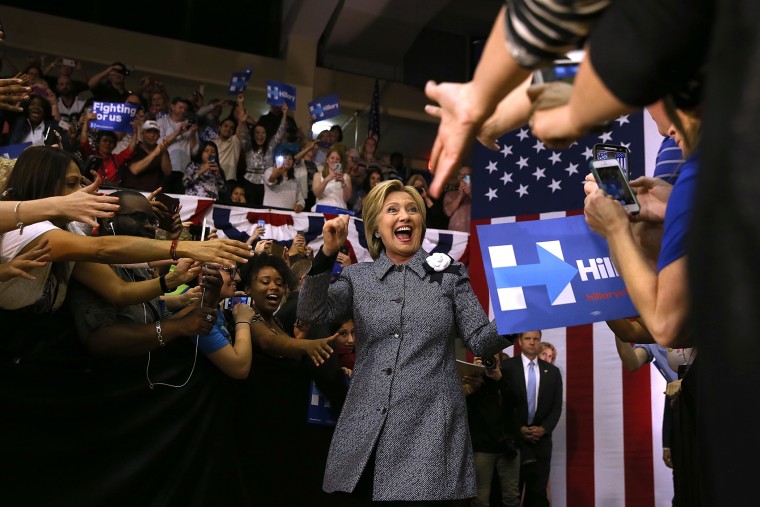First Read is a morning briefing from Meet the Press and the NBC Political Unit on the day's most important political stories and why they matter.
Clinton, Trump start leaving their rivals in the dust
There was a reason we called last night "Separation Tuesday" -- it was the chance for the two front-runners, Hillary Clinton and Donald Trump, to put more distance between themselves and their competitors. And after crunching the math, it's clear that Clinton and Trump are beginning to leave their rivals in the dust. Let's start on the Democratic side, with Hillary Clinton sweeping last night's five states (with "apparent" wins in Illinois and Missouri): Clinton holds a 707-delegate lead over Sanders among all delegates, 1,565 to 858. And among pledged delegates, it's 1,129 to 835 -- a difference of 294. To get to the magic number of 2,383 to clinch the nomination, Clinton needs to win 41% of the remaining delegates, while Sanders needs to win 76%. Let us repeat: Sanders needs to win 76% (!!!) of the remaining delegates, which is almost impossible under the Democrats' proportional system. The game isn't over. But Clinton is up four touchdowns midway through the 3rd quarter.
Trump nearly tripled his delegate lead over Cruz
If Clinton is up four touchdowns, well, Trump is ahead of his GOP rivals by two scores: There is time to catch him, but you'd rather be Trump than those trying to stop him. After winning four of five states last night (with an "apparent" victory in Missouri), Trump holds a 248-delegate lead over Cruz, with 60 delegates remaining to be allocated after last night. Going into last night, Trump's lead was 95 -- so he almost tripled his advantage over Ted Cruz. The delegate numbers:
- Trump 656 (has won 47% of allocated delegates)
- Cruz 408 (29%)
- Rubio 172 (12%)
- Kasich 138 (10%)
Trump needs to win 55% of remaining delegates (including 60 left from last night) to reach 1,237 magic number
Cruz needs to win 79% of remaining delegates (including 60 left from last night) to reach 1,237 magic number
Kasich needs to win 104% of the remaining delegates (including 60 left from last night) to reach 1,237 magic number
So how did Trump put more distance between himself and Cruz after losing Ohio (and its 66 winner-take-all delegates) to John Kasich? Answer: Illinois and Missouri. As the Cook Political Report's David Wasserman wrote earlier, "Illinois and Missouri could functionally become winner-take-all too. Both states award their delegates on a congressional-district level. So if Trump (or someone else) sweeps their congressional districts, that candidate will win all the delegates." Indeed, Illinois and Missouri are good examples of how Trump can win 55% of the remaining delegates, especially in a three-man field. Trump's support is across the board, while Cruz tends to perform well in very conservative/evangelical areas. That trend bodes well for Trump in the remaining states.
The Republican establishment gets knocked down
Outside of the vote totals and delegate math, maybe the biggest political headline from last night was how the Republican establishment got knocked down. Not only did its last hope -- Marco Rubio -- drop out of the GOP race, but the #NeverTrump effort lost badly. In Florida alone, anti-Trump groups and Rubio's Super PAC spent nearly $16 million over the airwaves to stop Trump, versus $2.2 million that Trump spent. And guess what: Trump beat Rubio in his home state, 46%-27%. There is still a considerable anti-Trump attitude among GOP voters: In Ohio, 44% of GOP primary voters said that if Trump and Hillary are the general-election candidates in November, they would consider voting for a third-party candidate. So Trump has some work to do uniting his party. But first, anti-Trump Republicans need to find a messenger.
And the GOP establishment is on the verge of getting knocked out
With Trump getting closer and closer to being the Republican Party's nominee, it's worth noting how the GOP establishment is on the verge of getting knocked out -- for good. Look at the scoreboard over the last six years: Christine O'Donnell and Ken Buck kept the GOP from winning a Senate majority in 2010; Todd Akin, Richard Mourdock and Barack Obama's re-election happened in 2012; and while 2014 was mostly a good year for the establishment bounced back, Eric Cantor lost his primary, and John Boehner left his speakership less than a year later. And now Trump could very well be the Republican Party's nominee. Folks, we've been watching a statue crumble over the past six years…
Separation Tuesday -- by the numbers
GOP race
States won: Trump 4 (FL, IL, NC, MO*), Kasich 1 (OH)
Delegates won: Trump 194, Kasich 75, Cruz 32, Rubio 6, with 60 delegates remaining to be allocated (the bulk in Illinois).
Dem race
States won: Clinton 5 (FL, IL*, MO*, NC, OH)
Delegates won: Clinton 363, Sanders 282, with 46 delegates remaining to be allocated (the bulk in Florida and Illinois)
The polls were right
By the way, if political observers are going to beat up the polls after one state (Michigan D) was wrong, it's time to beat our chests when the polls -- in Florida, Ohio, Illinois -- turned out to be right, especially from our partners over at Marist.
Obama to pick SCOTUS replacement: Let the Supreme Court battle begin
Last but certainly not least, President Obama will make his Supreme Court pick at 11:00 am ET. The most likely picks: DC Circuit judges Sri Srinivasan, Patricia Millet, and Merrick Garland; 8th Circuit judge Jane Kelly; and 9th Circuit judge Paul Watford. A reminder: This month's national NBC/WSJ poll found a plurality of American voters (48%) preferring that the U.S. Senate vote THIS YEAR on the replacement for the late Antonin Scalia. And a majority (55%) said they would disapprove of the U.S. Senate NOT CONSIDERING Obama's eventual nominee. Let the Supreme Court battle begin.
This story first appeared on NBCNews.com.
